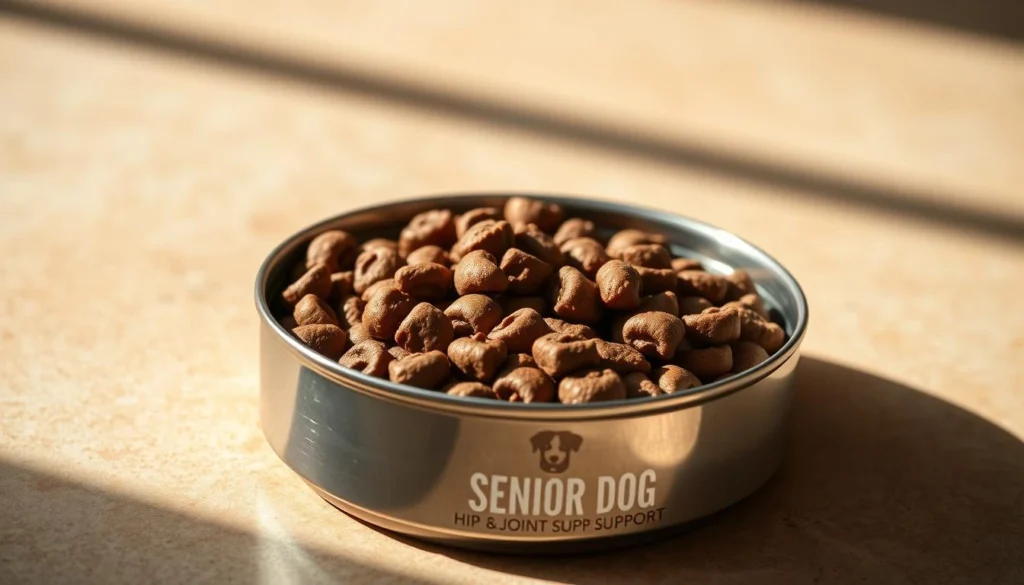best dog food for senior dogs with arthritis
Introduction
As dogs age, their nutritional needs change especially when conditions like arthritis begin to affect their joints and movement. For many senior dogs, even routine activities like walking or standing up can become painful. While medical treatments and supplements are often used, one of the most impactful ways to support an aging dog with arthritis is by adjusting their diet.

Choosing the right food for a senior dog with joint issues isn’t just about filling their bowl, it’s about easing discomfort and promoting long-term mobility. Foods rich in anti-inflammatory ingredients, like omega-3 fatty acids, can help reduce swelling and stiffness. Nutrients such as glucosamine and chondroitin also play a key role in repairing and protecting joint cartilage, helping older dogs move with greater ease.
In this article, we’ll take a closer look at how diet affects joint health and explore the top dog food options that are designed to support senior dogs dealing with arthritis. Whether you’re considering store-bought formulas or vet-recommended blends, understanding what goes into your dog’s food can make all the difference in their comfort, energy, and quality of life.
Table of Contents
Understanding Arthritis in Senior Dogs
As your dog gets older, it’s key to understand how arthritis affects them. Arthritis is a disease that makes joints wear down, impacting your dog’s movement and happiness. Knowing how it affects your senior dog helps you give them the right care and food.
How Arthritis Affects Your Dog’s Mobility and Quality of Life
Arthritis causes pain, stiffness, and makes it hard for dogs to move. Basic tasks, like getting up or walking, can become challenging. This can lower your dog’s happiness and health.
Arthritis can also lead to weight changes because senior dogs move less. It’s important to manage arthritis to keep your dog active and happy.
- Reduced mobility due to pain and stiffness
- Difficulty with everyday activities like walking or standing up
- Potential for secondary health issues due to decreased activity
Recognizing the Signs of Joint Pain in Aging Dogs
Recognizing joint pain in senior dogs early is essential. Look for limping, stiffness, and trouble getting up. Your dog might also show pain when touched or act differently, like being quieter or grumpy.
Monitoring for these signs and reaching out to your vet is essential. Changing their diet to include food for senior dogs with arthritis can help ease their pain.
The Connection Between Diet and Joint Health
The right food can greatly improve an older dog’s life with arthritis. A balanced diet supports health and helps manage arthritis symptoms.
Good nutrition is essential for reducing inflammation, a big cause of arthritis pain. Foods with anti-inflammatory properties can ease pain and improve movement in senior dogs.
How Proper Nutrition Reduces Inflammation
Inflammation is a big reason for arthritis pain. Some nutrients have anti-inflammatory effects. For instance, omega-3 fatty acids found in fish oil can help lower inflammation.
Antioxidants are also important in fighting oxidative stress, which can make inflammation worse. Adding antioxidant-rich foods or supplements to your dog’s diet can help manage arthritis symptoms.
Weight Management: A Critical Factor in Joint Stress Reduction
Keeping your dog at a healthy weight is key to reducing joint stress. Extra weight can strain joints, making arthritis symptoms worse. A balanced diet and regular exercise make it easier to keep your dog at a healthy weight.
A vet-recommended senior dog diet for arthritis will have the right nutrients for weight management and joint health.
| Nutrient | Benefit for Arthritic Dogs | Food Sources |
| Omega-3 Fatty Acids | Reduces inflammation | Fish oil, flaxseed |
| Glucosamine and Chondroitin | Supports cartilage health | Shellfish, cartilage |
| Antioxidants | Combats oxidative stress | Fruits, vegetables, nuts |
Essential Nutrients for Senior Dogs with Arthritis
Senior dogs with arthritis need the right nutrients to feel better. As dogs grow older, their nutritional requirements naturally change. Certain nutrients help with joint health and reduce pain.
Omega-3 Fatty Acids: Nature’s Anti-Inflammatory
Omega-3 fatty acids are great for fighting inflammation. They help ease joint pain in senior dogs, and foods like fish oil are rich in these beneficial fats.
Adding omega-3s to your dog’s diet can make them move better and feel less pain.
Great sources of omega-3 fatty acids include:
- Fish oil
- Flaxseed
Glucosamine and Chondroitin for Cartilage Support
Glucosamine and chondroitin help keep cartilage healthy. They improve joint mobility and help reduce pain, which is why vets often recommend them for arthritis.
Antioxidants That Combat Joint Inflammation
Antioxidants fight inflammation in joints. They stop free radicals from harming joint tissues. Vitamins C and E are essential antioxidants.
Foods like blueberries and spinach are full of these vitamins. Adding them to your dog’s diet could help ease arthritis symptoms.
Best Dog Food for Senior Dogs with Arthritis
As your dog gets older, managing arthritis becomes essential, and the right dog food can make a significant difference.
The link between diet and joint health is well-known. Selecting the right dog food can greatly improve your dog’s quality of life.
Vet-Recommended Prescription Diets for Arthritis Management
Veterinarians often recommend prescription diets for managing arthritis in senior dogs.
These diets are designed to meet specific nutritional requirements. They assist in reducing joint pain and inflammation.
- Hill’s Prescription Diet
- Royal Canin Veterinary Diet
- Purina Pro Plan Veterinary Diets
Top-Rated Commercial Foods for Joint Health
In addition to prescription diets, several commercial dog foods are highly rated for their joint health benefits.
These foods are often enriched with glucosamine and chondroitin. They support cartilage health for senior dogs.
- Blue Buffalo Life Protection Formula
- Nutro Ultra Senior Dog Food
- Merrick Grain-Free Senior Dog Food
Fresh and Raw Food Options for Arthritic senior Dogs
Some dog owners prefer fresh and raw food diets for their arthritic dogs. They believe these diets offer more natural benefits.
It’s crucial to ensure that any fresh or raw diet is well-balanced. It must meet your dog’s nutritional needs.
By considering these options and consulting with your veterinarian, you can make an informed decision. This will help you choose the best dog food for your senior dog with arthritis.
Grain-Free vs. Whole Grain Options for Arthritic Dogs
Choosing the right diet for a senior dog with arthritis often raises one big question: should you feed grain-free or whole grain food? While both options have benefits, the best choice depends on your dog’s individual health needs, sensitivities, and how they respond to certain ingredients.
Grain-free dog food omits standard grains such as wheat, corn, and rice. Instead, it uses other carbohydrates such as sweet potatoes, lentils, or peas. These formulas are sometimes recommended for dogs with allergies or intolerances that may trigger inflammation. For arthritic dogs, inflammation is a serious concern, and reducing potential allergens in the diet may provide some relief. Grain-free diets also tend to include more animal protein, which helps maintain muscle strength a key factor in supporting aging joints.
On the other hand, whole grain food contains natural, unprocessed grains like brown rice, barley, or oats. These grains are rich in fiber, vitamins, and minerals, and they help provide steady energy throughout the day. More importantly, whole grains can help control weight by keeping your dog feeling full longer. Maintaining a healthy weight reduces pressure on sore joints, which is crucial for arthritic dogs.
Not every senior dog needs to avoid grains. Unless your dog has a diagnosed sensitivity or allergy, whole grains are generally safe and even beneficial. The most important factor is the overall quality of the food and whether it includes joint-supportive nutrients like glucosamine, chondroitin, and omega-3s.
Bottom line: Grain-free might help with inflammation or allergies, while whole grain supports digestion and weight control. There’s no one-size-fits-all answer what matters most is how your dog responds to the ingredients.og.
Key Ingredients to Consider for Senior Dogs Joint Health Nutrition
Arthritic senior dogs require a tailored diet to support joint health. The right foods can help ease pain, improve movement, and make their life better.
High-Quality Protein Sources for Muscle Maintenance
High-quality protein is essential for maintaining strong muscles, which in turn helps support joint health. Look for dog foods with named proteins like chicken, salmon, or lamb. These proteins are full of important amino acids and easy to digest, giving your dog the nutrients they need without extra fillers.
- Chicken: Rich in essential amino acids and highly digestible.
- Salmon: An excellent source of omega-3 fatty acids and premium protein.
- Lamb: A unique protein option that can be helpful for dogs with food sensitivities.
Beneficial Fats and Oils for Joint Lubrication
Good fats and oils, like omega-3 fatty acids, are important for reducing inflammation and keeping joints lubricated. Omega-3s come from fish oil, flaxseed oil, and chia seed oil. These help lessen pain and stiffness, making it easier for your dog to move.

Natural Anti-inflammatory Ingredients
Other natural ingredients can also help with arthritis. Turmeric, with curcumin, is very good at fighting inflammation. Green-lipped mussel extract also supports joint health and reduces inflammation.
- Turmeric/Curcumin: Potent anti-inflammatory properties.
- Green-lipped mussel extract: Promotes joint health and helps reduce inflammation.
By choosing these key ingredients, you can make sure your senior dog gets the nutrients they need to manage arthritis well.
Ingredients to Avoid in Your Senior Dog’s Arthritis Diet
Managing your senior dog’s arthritis through diet means more than just adding good stuff. It’s also about avoiding ingredients that can make things worse. Some dog foods have ingredients that can cause or increase inflammation.
By knowing which ingredients to avoid, you can make better choices for your dog’s diet. This helps manage their arthritis more effectively.
Common Inflammatory Ingredients in Commercial Dog Foods
Some dog foods have ingredients that can cause or increase inflammation. These contain fillers and by-products that provide little nutritional benefit. They can even trigger bad reactions in some dogs.
For example, beef, dairy, and soy are common allergens that can cause inflammation in sensitive dogs. Also, too many omega-6 fatty acids without enough omega-3 can promote inflammation.
Fillers and Additives That May Worsen Joint Pain
Fillers and certain additives in dog food can be more harmful than beneficial. They lack nutritional benefits and can make joint pain worse. Ingredients like corn, wheat, and soy are often used as fillers and can be a problem for dogs with sensitivities or allergies.
Some preservatives and artificial coloring can also harm your dog’s health. They might make arthritis symptoms worse.
When choosing food for your senior dog with arthritis, be sure to read the labels thoroughly. Choose products with named protein sources, whole vegetables, and fruits. Avoid those with unnecessary fillers and additives.
Practical Feeding Tips for Dogs with Hip and Joint Issues
Feeding your senior dog with arthritis needs careful thought. Their diet should cater to both their nutritional requirements and overall comfort. As dogs age, their diet changes, and managing arthritis through food is key.

Serving Strategies: Portion Control and Feeding Frequency
Maintaining a healthy weight for your dog is crucial for supporting joint health. Portion control helps keep them at a healthy weight, easing joint stress. Feeding them more often can also help manage weight and reduce inflammation.
Consider feeding your dog smaller meals three times a day. This can keep their energy steady and lower inflammation from big meals.
Food Texture and Bowl Placement for Comfortable Eating
The texture of your dog’s food affects their comfort while eating. Dogs with arthritis might find softer foods easier to chew and swallow. You can make their kibble softer by adding warm water or switch to wet food.
Also, think about where you place their bowl. Elevated bowls can ease neck and joint strain, making meals more comfortable. Make sure the bowl is at a height that makes eating easy for your dog.
Transitioning to a New Arthritis-Friendly Diet
Introducing your senior dog to a new arthritis-friendly diet should be done gradually and with care. Sudden changes in food can upset your dog’s digestive system, especially in older pets whose stomachs may already be sensitive. A slow transition not only prevents stomach discomfort but also gives your dog time to adjust to the new taste and texture.
Start by mixing a small amount of the new food with your dog’s current food about 25% new and 75% old. Over the next 7–10 days, slowly increase the portion of the new food while decreasing the old. This steady adjustment helps avoid issues like diarrhea, vomiting, or refusal to eat.
As your dog adapts, keep an eye on their energy, mobility, and stool consistency. An arthritis-friendly diet enriched with nutrients like omega-3s, glucosamine, and antioxidants may show noticeable improvements in joint flexibility and comfort after a few weeks. However, results vary based on the severity of the condition.
Remember, patience is key. Transitioning to a new diet is not just about changing what’s in the bowl—it’s about supporting your dog’s health and giving them a more comfortable, active life.
Conclusion: Supporting Your Senior Dog’s Joint Health Through Nutrition
As your dog ages, their nutritional requirements evolve. Arthritis can quietly reduce their quality of life, making even simple movements painful. The good news? Thoughtful dietary choices can play a powerful role in easing this burden.
Feeding your senior dogs a diet designed to support joint health isn’t just a wellness trend it’s a long-term investment in their comfort and mobility. Nutrients like omega-3 fatty acids help reduce inflammation, while glucosamine and chondroitin contribute to the maintenance of cartilage and joint fluid. These components, when included consistently in their meals, may help slow joint degeneration and improve flexibility over time.
It’s not only about what’s added, but also about maintaining balance. Keeping your dog at an ideal weight through portion control and the right ingredients can prevent extra pressure on aching joints. Every pound matters when your dog is already struggling to move comfortably.
Tailoring your senior dog’s diet to meet their joint health needs can make everyday life more enjoyable for both of you. By choosing the right foods and observing how your pet responds, you’re actively enhancing their well-being and extending their vitality.
Proper nutrition isn’t a cure, but it is a powerful step toward a more comfortable, active life.
FAQ
What are the top dog food choices for senior dogs with arthritis?
For senior dogs with arthritis, the best foods are vet-recommended diets and top-rated commercial foods. These focus on joint health. Also, fresh and raw foods are good, as they have anti-inflammatory ingredients and essential nutrients.
How does diet impact my senior dog’s arthritis?
A well-balanced diet can significantly ease arthritis symptoms in senior dogs. Nutrients like omega-3 fatty acids, glucosamine, and antioxidants help reduce inflammation, support joint repair, and maintain mobility. Proper nutrition also helps manage weight, lessening stress on aching joints and improving your dog’s comfort and quality of life.
What nutrients are beneficial for senior dogs with arthritis?
Omega-3 fatty acids, glucosamine, chondroitin, and antioxidants are good for senior dogs with arthritis. They help reduce inflammation, support cartilage, and fight joint pain.
Should I consider a grain-free diet for my arthritic senior dog?
A grain-free diet may benefit arthritic senior dogs with grain sensitivities, as it can reduce inflammation. However, consult your vet to ensure it’s the right choice for your dog’s needs.
What ingredients should I avoid in dog food for my senior dog with arthritis?
Avoid foods with inflammatory ingredients, fillers, and additives. These can worsen arthritis. Opt for dog foods without these to better manage your dog’s condition.
How can I transition my senior dog to a new arthritis-friendly diet?
Gradually introduce a new diet over 7-10 days. Mix the new food with their current diet to avoid digestive issues.
Are there any specific feeding strategies that can help my senior dog with arthritis?
Yes, feed smaller, frequent meals with joint-supporting nutrients, maintain a healthy weight, and avoid inflammatory ingredients like fillers.
Can natural dog food help manage my senior dog’s arthritis?
Yes, natural dog food can help manage arthritis. Seek out foods that contain high-quality protein, healthy fats, and natural anti-inflammatory ingredients.








One Comment